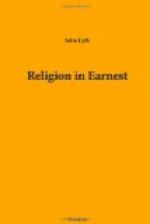a stiff and precise order reigned through the whole
household; but it wanted the charm and life of spiritual
feeling. As the children grew up to maturity,
this state of things was destined to be changed by
the introduction of a new and unwelcome element, which
seriously disturbed the never too profound tranquillity
of the old man. Mary, the youngest child, whose
mind had gradually opened to the truth, although so
defectively communicated, became deeply convinced
of sin under the ministry of Mr. Jackson, the parish
clergyman; and so painful and vivid were her views
of her miserable condition, that she cried aloud for
mercy in the church. Her father was deeply concerned
for her, but, as he was ignorant of spiritual religion,
he was utterly at a loss to understand her feelings.
As a last resource he sent for the minister, but with
no better result, for he too, frankly confessed that
he did not understand the sorrow of which he had been
the unwitting occasion. A specimen of this gentleman’s
ability to administer spiritual counsel and direction
is recorded in the characteristic autobiography of
Richard Burdsall. “Visiting Mr. Stables
in his last illness Mr. Jackson asked him how he did.
Mr. S. replied, ‘Sir, I am a miserable sinner.’
’Do not say you are a miserable sinner,’
replied the Reverend gentleman, ’for you are
a good man.’ Mr. S. answered, ’O,
Mr. Jackson, I am a miserable sinner.’
To this the parson replied, ’if you will be a
miserable sinner you are like to be a miserable sinner,’
and so came no more.”
Mary was thus left to seek relief and comfort where
she could; and having heard of the Methodists, who
held a meeting every Sabbath in a house about a mile
distant from Harewood, she secretly resolved to attend,
if possibly, she might find the hidden peace, which
she had hitherto sought in vain. Here she met
with a few humble but sincere persons, who could sympathise
with her state of mind; and from whom she received
such instruction and encouragement, that, not long
after while pleading with God in the secrecy of her
chamber, she obtained ’redemption through the
blood of Christ, even the forgiveness of sins.’
Much to the chagrin of her father, she now became an
avowed Methodist; and was subjected to the petty persecution,
which usually awaits the first in a family that embraces
vital godliness. On one occasion, her father
locked her out of the house; and, on another, threatened
to shoot her, but she remained firm to her profession;
until at length, her consistent and steady deportment
was rewarded by the conversion of her two brothers,
John and William, and also of two of the servants.
The increased displeasure of the old gentleman was
signally exhibited. Afraid lest Elizabeth his
eldest daughter should also become a Methodist, he
resolved at once to free his house from all possibility
of infection. The two servants were dismissed
without ceremony; and the three delinquents banished
to a farm, which he had purchased, at Kirkby Overblow,




